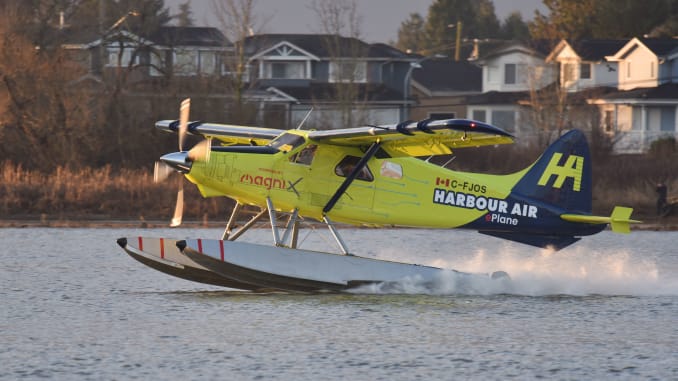By Sammie Jones
The world’s first electric commercial aircraft has undergone its first testing by “This proves that commercial aviation in all-electric form can work,” said Roei Ganzarski, chief executive of Australian engineering firm magniX.
The company worked in partnership with Harbour Air which transports half a million passengers a year between Vancouver, Whistler ski resort and nearby islands and coastal communities. Chief Executive of Australian engineering firm magnix said : “This proves that commercial aviation in all-electric form can work.”
Ganzarski said the technology would mean significant cost savings for airlines and zero emissions. “This signifies the start of the electric aviation age,” he said. The e-plane – a 62-year-old, six-passenger DHC-2 de Havilland Beaver seaplane retrofitted with a 750hp electric motor – was piloted by Greg McDougall, founder and chief executive of Harbour Air. “For me that flight was just like flying a Beaver, but it was a Beaver on electric steroids. I actually had to back off on the power,” he said.
McDougall took the plane on a short trip along the Fraser River near Vancouver international airport in front of around 100 onlookers soon after sunrise. The flight lasted less than 15 minutes, according to an AFP journalist on the scene.
“Our goal is to actually electrify the entire fleet,” said McDougall. On top of fuel efficiency, the company would save millions in maintenance costs because electric motors require “drastically” less upkeep, Mr McDougall said.
Harbour Air is set to wait at least two years before its fleet of over 40 seaplanes will be electrically operated and verified for reliability and safety. In addition, the electric motor must be approved and certified by regulators.
In Ottawa, transport minister Marc Garneau said ahead of the maiden flight that he had his “fingers crossed that the electric plane will work well”. If it does, he said: “It could set a trend for more environmentally friendly flying.”
While the world waits, he said cheaper short-haul flights powered by electricity could transform the way people connect and where they work. “If people are willing to drive an hour to work, why not fly 15 minutes to work?” he said.

